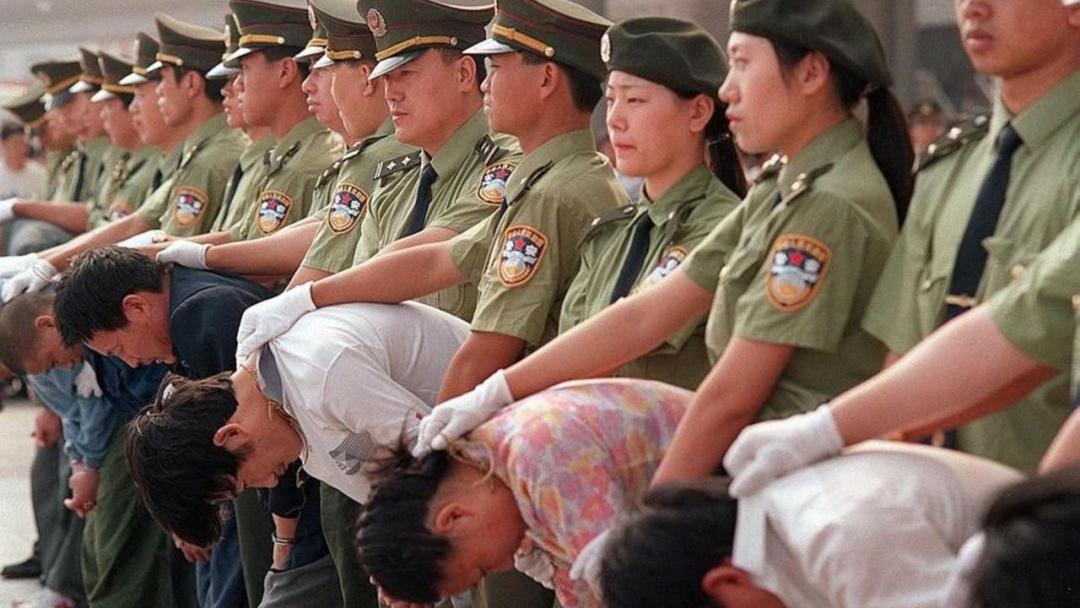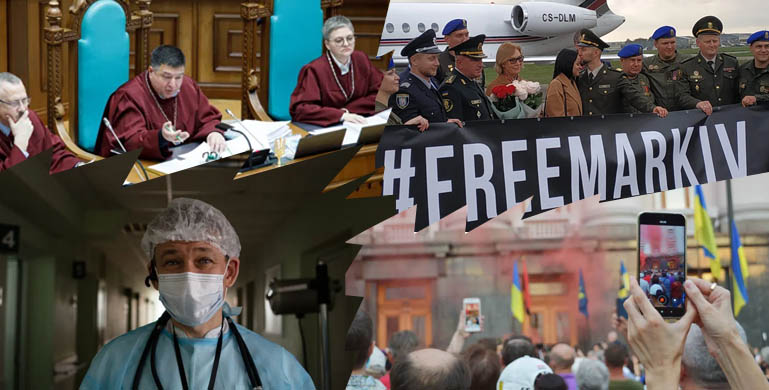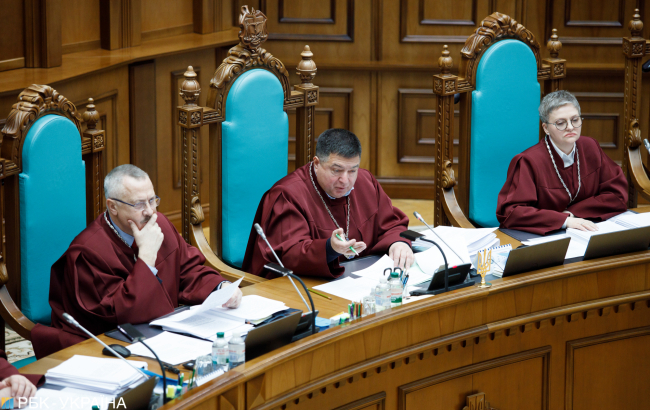"Fighting corruption is something that all the countries of the world have to do and what their peoples want to see... The masses hate corruption the most, and we must act to dispel their fears.”
Such were the words of Xi Jinping, the current Secretary General of the Communist Party of China. During the last 5 years, 1.5 million Chinese officials were suspected of corruption. 2/3 of the accused were dismissed from office and expelled from the party, dozens of thousands were sentenced and thousands were shot, including top party officials. In Ukraine, the figures are way more modest. Of course, there were no death penalties, but also almost no sentences. Ukraine has only 2,000-3,000 penalties for corruption annually, but the largest penalty for corruption is only 42,000 UAH (US$1500) with confiscation of the bribe.
The difference between China and Ukraine's corruption-fighting methods is staggering because Ukraine's legal system is quite lenient to accused officials. However, China’s Corruption Perception Index of 39/100 and Ukraine's of 32/100 are not too far away from each other. Thus, China's corruption-fighting theater appears to not influence public opinion that much: citizens still think that their country is corrupt.

Yet, what Xi Jinping is right about people wanting to see the fight against corruption with their own eyes. If the government fails to bring top officials to justice, it would not be trusted regardless of all the positive economic data. That was what happened in the Ukrainian presidential elections, with a landslide victory of Volodymyr Zelenskyy over professional politician Poroshenko.
Read also:
How Ukrainians' perception of corruption changed after Euromaidan
The analysis results of the Institute for Economic Research and Political Consulting indicate that Ukraine has made significant achievements in overcoming corruption by radically changing the rules of the game on public procurement and the gas market, improving tax administration, and introducing unprecedented transparency, which allowed the public to scrutinize the assets of officials.
However, these reforms have forced millions of Ukrainians who avoided taxes, smuggled goods from abroad, or bribed authorities to get preferential treatment for their businesses to radically change their mode of work. Generally, these reforms, despite their economic success, were rather unpopular and even criticized. The same processes are currently in play in the ongoing medical reform, which requires playing by the rules. The amount of criticism regarding the threefold rise of gas prices was overwhelming - in fact, lowering tariffs is the number two expectation of Ukrainians towards Zelenskyy - despite its destructive effect for corruption schemes in the sector.
It might well be that the anxiety from change, and the reluctance of Poroshenko's government to jail high-ranking officials, generated a wide-spread resentment towards the government, which was already seen by ordinary Ukrainians as the main culprit of whatever misfortunes they have. A PACT study revealed that Ukrainians believe those who are responsible for the anti-corruption policy are least willing to fight corruption. In fact, the post-Euromaidan Parliament, Cabinet, and President conducted several important institutional reforms, excluding judicial reform, but were still perceived negatively.
What gives hope is that radical change of the whole system and change in behavior of thousands of ordinary Ukrainians indeed leads to a real elimination of corruption, even if it was not seen and emphasized by the media. Punishments of top officials, in that case, will become only a beautiful end of the era of corruption, not a constant process of demonstrative “fighting.” The evidence gives reason to think so. The part of Ukrainians encountering corruption in their lives declined from 67% in 2007 to 41.5% in 2018. Most significant was the decline after the last reforms of public institutions after 2014.

Unfair courts increasingly appear to be a wild rudiment on the body of the changing political system, not only obstructing justice but also the ability of Ukrainians to see positive steps made after Euromaidan to tackle corruption. Let’s define these main achievements as well as steps which still separate Ukrainian society from the first anti-corruption punishments.
Gas sector reform as the main anti-corruption initiative
Operations on import, transit, and distribution of gas within the country were a source of enrichment of many Ukrainian oligarchs and caused the largest state budget losses due to corruption.
For example, only in 2005-2008, approximately $38.6 bn ($9.65 bn annually, 5% of GDP) were laundered through the company RosUkrEnergo owned by Ukrainian oligarchs Dmytro Firtash, Ivan Fursin, and Russia's Gazprom. RosUkrEnergo transferred gas from Russia and sold it in Ukraine with a large difference in the prices of purchase and sale but was subsidized by the state.
The years-long artificial deflation of gas prices brought about significant losses for Ukraine. The losses of state-owned Naftogaz Group in 2005-2015 were estimated at UAH 620 bn, which roughly equals $5 bn of annual state losses. Finally, $3 bn more were lost annually in 2009-2014 due to contracts with Russia’s Gazprom signed by Yuliya Tymoshenko when she was prime-minister of Ukraine in 2009. These contracts included inflated prices paid by the state, as well as Ukraine's obligation to buy a certain amount of gas even if not consumed.

When market prices for gas were established after 2014 and the gas sector was deregulated, Naftogaz grew from being a tremendously inefficient state company to reaping a profit of UAH 26.5 bn ($1 bn) in 2016. Today, Naftogaz is Ukraine's largest taxpayer.
The rise of gas prices was a devastating blow for corruption in the sector not only because of lower state expenses. A number of cheating schemes founded on the availability of cheap gas were also destroyed. The mass fraudulent registration of enterprises as several non-existent private consumers to receive gas at cheaper prices is only one example. Now, this scheme ceased to exist.
Taxpaying reform: it became harder to avoid taxes
So-called “tax holes” in the tax system were yet another major institutional problem of Ukrainian state which encouraged corruption. The scheme was based on the creation of Special Purpose Vehicles (SPV). Typically, SPV is a separate legal entity created by the main company to carry risks. In Ukraine, these SPVs were used to illegally withdraw costs and profits of businesses without paying taxes, especially taxes on corporate profits and VAT. According to the General Prosecutor’s Office of Ukraine, during 2011-2013 SPVs led to 43.8 billion UAH ($5.3 billion) losses in the state budget because of not received VAT, and from non-paid tax on corporate profits amounting to 52.1 billion UAH ($6.4 billion). Roughly it means 5-10% of budget costs not received just because of one institutional inconsistency.
In 2015, the Cabinet launched a campaign against SPVs. In total, during 2016, the State Fiscal Service stopped operations of 77 SPVs which contributed to an additional 4 billion UAH ($0.2 billion) of received taxes. Another 11 billion UAH of taxes ($0.6 billion) were received due to the issue of the system of electronic administration of VAT. It has lead to the legalization of number of a shadow schemes.
The last important action made in the sphere were automatic VAT refunds for businesses. Previously, in order to receive VAT refunds, the business usually had to pay bribes to officials in the tax service. This system was made virtual and automatic due to the reform in 2017. No more does a business have to “persuade” someone in the tax service that it has the right to receive a VAT refund, but the tax service pays the refund automatically if no contravention was found.

ProZorro system – reform of state procurements and competitive privatization
Public procurement was one of the largest areas of corruption abuse at all levels of power in Ukraine. According to the Security Service of Ukraine, annual losses from corruption schemes in the field of procurement constituted 10-15% of the state budget or 35-52.5 billion UAH ($4.3-6.4 billion) in 2013. 1/3 of the budget of the Euro-2012 football championship was laundered by authorities.
These possibilities of making easy profits ceased to exist when the Prozorro system started to work. This electronic system of state procurements based on open auctions where anybody can check any procurement, led to an increased number of auction participants and lower prices paid by the state for procurements. For authorities, it is now much harder to purchase something from a particular affiliated company in exchange for kickbacks.
The Prozorro system of electronic public procurement helps the state save about $1 billion annually, according to Vasyl Zadvornyi, its General Director. In 2018, 50,000 new enterprises joined the ProZorro electronic trading system. About 4000 procurements are announced every day. However, smaller procurements up to 250,000 UAH are not transparent yet. The Parliament didn’t adopt a law that would regulate them. Another important vector for future development is control not only over the procurement itself, but also over the execution of the purchased works.
ProZorro.Sales was a related project. By the same system, it used the auction procedure for small privatization of state enterprises or assets. Additionally, ProZorro.Sales has earned over 12.2 billion UAH ($0.5 billion), according to Oleh Soboliev, director of ProZorro.Sales.

Decentralization, transparency, the medical reform are among other key reforms which also work for the anti-corruption agenda. The scale of the eliminated corruption due to these reforms is not estimated numerically yet. However, since the healthcare system was defined by Ukrainians as being most corrupt, the impact should be significant. There are many things still to be done, like liberalization of the land market. Only this reform, if implemented, is expected to add around 2% to Ukraine’s annual GDP growth.
Yet, all these reforms are not so popular, their importance is not always understood by the wider public, especially when the results require waiting a few years. Meanwhile, the so desirable punishments are believed to be the main tool against corruption. So, what about them?
Achievements of the law enforcement agencies and their main problems
A national anti-corruption bureau, national corruption prevention agency, special anti-corruption prosecutor's office, and, after long waiting, the anti-corruption court were created in Ukraine as a new parallel law enforcement system which should deal only with cases of corruption.
Prior to 2013, the Criminal Code of Ukraine already contained articles according to which officials gaining unlawful profits could be sentenced. And many were convicted. The paradox of the reform is that before 2013, there were more court decisions and sentences in cases of corruption than in 2016-2017, with almost the same number of cases registered and investigated annually!
This striking data was published by the report of the Institute for Economic Research and Political Consulting and is shown in tables below.
Property gained by abuse of office:
| Year | № of convicted (% from cases considered by courts) |
| 2010 | 1641 (80.6%) |
| 2011 | 1560 (73%) |
| 2012 | 1411 (77.1%) |
| 2013 | 1072 (80.5%) |
| 2014 | 876 (75.9%) |
| 2015 | 571 (76.5%) |
| 2016 | 294 (69.7%) |
| 2017 | 204 (63.2%) |
Officials accepting offers, promises, or receiving unlawful benefits (bribes):
| Year | № of convicted (% from cases considered by courts) |
| 2010 | 774 (85.1%) |
| 2011 | 767 (73.1%) |
| 2012 | 702 (79.7%) |
| 2013 | 731 (92.9%) |
| 2014 | 439 (90.7%) |
| 2015 | 375 (95.2%) |
| 2016 | 264 (87.2%) |
| 2017 | 218 (87.5%) |
Altogether, the level of convictions for the most dangerous and widespread corruption crimes over the past seven years has fallen six times. The reason for this tremendous decline lies first of all in the bad reform of the judicial system. Many judges are not appointed and not working due to the badly organized system of their qualification. Almost 40% of appointed judges are defined by the Dejure foundation as not fair. They tend to delay cases on corruption.
- Read also: Court decision on Privatbank proves Ukraine’s judicial reform was failed. Here’s how to fix it
The National Anti-Corruption Bureau (NABU, search and pre-trial investigation) and state bureau of investigations (DBR, pre-trial investigation) are among the most successful special anti-corruption institutions. Yet, they still have a number of problems. The first obvious one is that NABU and DBR duplicate the responsibilities of each other. In that way, the reform appears to be quite badly planned.
NABU and DBR have many cases already investigated and passed to the courts. NABU has investigated 730 cases, in which 325 persons were accused and 196 cases passed to the courts. This was followed by only 31 convictions. The courts are evidently the weakest link in the anti-corruption chain. DBR has opened more than 5,000 criminal cases but lacks skilled personnel to finish the work properly.
Another impediment for the anti-corruption detentions was recently created by the Constitutional court, which canceled liability for unlawful enrichment. This cancellation had a bad effect on the anti-corruption policy. It eliminated the importance of the system of electronic declaration of income for state officials. All subjects of e-declaration will receive an indulgence on suspicious income acquired during the last two and a half years. NABU should now close more than 80 cases.
Many required changes had not even started in the anti-corruption law enforcement system. Thus, NABU needs legal access to all communication data and wiretapping in order to conduct better investigations. The reform of the state security service is required in order to depoliticize the institution. It should cease to be a personal guard in the service of the president and remain only as an intelligence service for the cases of terrorism, foreign aggression, and national security. Also, the responsibilities of financial investigation should be taken away from SBU. Finally, there are other small details which stop effective punishment at each stage. Those details can be eliminated only by the strong political will of all branches of power together.
National corruption prevention agency (NAZK) – a special case of the theater of the absurd
The National Corruption Prevention Agency (NAZK) – was created in order to verify and review declarations of income of public officials. Yet, the institution did practically nothing during the four years of its existence. For three years, NAZK reviewed e-declarations by hand. Out of 3,000,000 declarations, the agency processed less than 1,000.
The system of automatic control was launched only in January 2019 because of the requirement from the IMF. The system had to process all declarations within hours and compare them with official e-databases. However, just on the day when the system was launched, NAZK changed the rules for reviewing declarations. Only a few declarations, which correspond to certain indicators were defined to be compared with the databases. What is more, the criteria were made public so that any official can now fill the declaration in a way to avoid being reviewed. And yet more – the information about the results of the review with datasets was defined not to be made public.
The NAZK actively reports on detected violations. For example, in May 2019, during the verification of declarations, secretary of the Zhytomyr City Council Nataliya Chyzh was accused of intentionally violating declaration submission rules and not declaring over 13.6 million UAH ($0.5 million). However, such rare cases are rather an imitation of activity - they don’t correspond to the real powers and abilities of NAZK.
Along with declarations, the agency has other important responsibilities which it, however, doesn’t fulfill. The agency is responsible for developing the state anti-corruption strategy. However, the last one ended in 2017 and since then, no new one was introduced. Because of the strategy is absent, the anti-corruption policy of different institution is not consistent.
Finally, NAZK is responsible for reviewing the political parties’ financial reports and the issuing state funds for political parties. However, all documentation about party finances should be provided in paper format which makes any further proper analysis almost impossible.

Definitely, NAZK needs to be restarted. Formally, NAZK is not subjected to any of the branches of power. However, in reality it serves as the main brake of the anti-corruption reform, along with the unfair courts. This is due to informal arrangements that are unlikely to be ever discovered. Yet, the engagement of international experts in the commission which appoints members of the agency may help, like it was with the anti-corruption court.
Tymofiy Mylovanov, newly-appointed Economy Minister and Honorary President of Kyiv School of Economics commented on the corruption issue in March 2019 that “fighting corruption through punishment, through the creation of various anti-corruption institutions does not work. Just as the war against drugs can’t be won because of the destruction of cartels. The fight against the shadow economy by fines is not working. As well as the fight against terrorists can’t be won because of the bombing of places where they live. Punishment does not work.
What works? Transparency, clear and equal rules, and the appointment of competent people to important positions. ProZorro works, the establishment of equal gas prices for industry and population works, as well as the reform of the National Bank and the introduction of standards for financial monitoring and supervision. The corporate governance of state-owned enterprises works."
From the economic point of view, what Tymofiy Mylovanov says is totally right. However, even when a political system is perfect, its legitimacy for the people will decay if offenders walk free. That is what Mary Mycio, lawyer and journalist, writes in her article to Atlantic Council. Even if sentences are not effective to fight corruption, they are definitely important to preserve justice, prestige, and the honor of the state. Taking this into account, it won’t be a surprise that, despite all achievements described in the first part of the article, a 2018 poll funded by USAID shows that share of those Ukrainians believing no positive changes will take place in politics grew from 42 percent to nearly half in one year.





